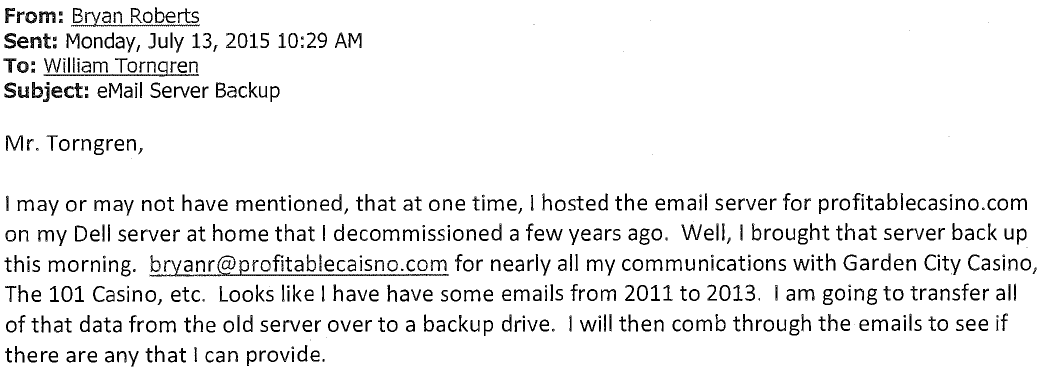When Eric Swallow unveiled Casino M8trix, he billed it as a break from the past. San Jose’s history with its two card rooms had been marked by indictments, financial failures and regulatory battles. The real estate scion promised that the glittering tower forged from the bankrupt ruins of Garden City Casino would change the game.
Measured in dollars, Casino M8trix has become a resounding success, raking in about $60 million a year in gross revenue. But it quickly fell into the same patterns of conflict as its card club predecessor.
In the five years since Swallow opened the seven-story gaming hall and a decade since he and his business partners bought the California-issued gambling license, he has been the subject of a state-led probe into suspected corruption, while also dealing with a costly divorce from ex-wife Deborah Swallow and a bitter dispute with casino co-owners Peter and Jeanine Lunardi. The Lunardis testified against Swallow in a case brought by the state Attorney General’s Office, which accused all three M8trix owners of hiding profits to dodge taxes and avoid paying into a gambling addiction program.
By now, Swallow says, he wants nothing more than to walk away from Casino M8trix. But his departure has been no less complicated than the issues that brought him to this point.
On May 25, the California Gambling Control Commission approved the sale of Swallow’s M8trix shares—but not to the buyer he had in mind. Swallow preferred John Park, who already has five card clubs to his name and vastly outbid the Lunardis with an offer to pay $55 million for half the business in 2015. But the state tapped the Lunardis and two other investors, Patrick and Jamie Tierney, to match that price and take over Swallow’s stake. Now Park is crying foul.
The would-be M8trix partner is accusing regulators of playing favorites. He also says the transaction has been tainted by nefarious activity, including illegal hacking and paying for witness testimony. In a letter to the Gambling Control Commission, Park’s attorney accuses state Deputy Attorney General William Torngren of “irregular, improper and, at times, likely illegal attempts to influence the sale” to the Lunardis’ benefit.
“[Torngren] has used the power of the state to conduct a concerted campaign to predetermine winners and losers among private parties in a card room transaction,” Park’s attorney, Scott Garner, wrote in a May 24 letter obtained by San Jose Inside.
The letter urged the commission to delay a decision on the sale until the allegations are investigated. The Attorney General’s Office denied Park’s claims, which echo accusations raised by Swallow in a lawsuit against the state, and commissioners went ahead and approved the purchase. Torngren declined to comment on the case.
Park’s attorney says Torngren vigorously prosecuted Swallow and went easy on the Lunardis, while also trying to drive down the M8trix purchase price. Garner accuses Torngren of withholding back pay from a financially desperate witness—a former M8trix worker named Bryan Roberts—unless he testified in support of the state’s case. Garner also claims that the state prosecutor encouraged that same witness to unlawfully hack Swallow’s emails and servers.
“In addition to effectively purchasing Mr. Roberts’ testimony, [Torngren] was, at a minimum, complicit in Mr. Roberts’ warrantless and illegal search of Mr. Swallow’s servers,” Garner wrote in his letter.
Roberts did not respond to a request for comment by press time. But in emails obtained by San Jose Inside through a formal records request, the former casino contractor talks about accessing years worth of Swallow’s old emails.

Source: City of San Jose
Park also takes issue with the disparity in penalties between Swallow and the Lunardis. Though the 18-month state probe failed to turn up evidence of tax evasion, it concluded that the casino had an unauthorized profit-sharing deal with a gaming services company, and that Swallow gave false financial information to the city of San Jose. The Lunardis worked out a deal with the state, admitting to some of the charges in exchange for keeping the gambling license.
The card room’s parent company, Garden City Casino, had to pay $1.5 million and the Lunardis personally got stuck with a $250,000 fine. Yet gaming commissioners, who govern the state’s Bureau of Gambling Control, demanded $13.8 million from Swallow, a record-breaking fine for the agency. By comparison, the highest fine ever leveled against a casino operator in Nevada—the nation’s preeminent gambling destination—came to $5.5 million, according to the state’s gaming commission. Records show that Torngren originally asked the commission to assess “the maximum possible fine,” as much as $18.8 million or 75 times what the Lunardis paid.
“It was a money grab,” Swallow says. “My partners and I were accused of all this wrongdoing, even though we had done nothing wrong, but they threw the kitchen sink at me and let them off easy. My partner wanted to keep his license, so he cut a deal, probably figuring, ‘I don’t have to outrun the bear, I just have to outrun you.’”
Tracey Buck-Walsh, the attorney representing the Lunardis, dismisses the allegations raised by Swallow and Park. “Two arbitrations over the last two years have affirmed the Lunardis’ contractual right to purchase Mr. Swallow’s shares,” she says. “Mr. Swallow recently agreed and in early April signed the stock purchase agreement with the Lunardis and Tierneys, which is the agreement the commission approved last week. … A person who wanted to buy Mr. Swallow’s shares attempted to interfere with the Lunardis’ purchase and failed.”
Former Attorney General Bill Lockyer came to Swallow’s defense, to no avail. Swallow hired the former politico to lobby regulators on his behalf, but that failed to sway the outcome. Lockyer says he’s troubled by the way things panned out.
Had a prosecutor offered financial incentive for witness testimony and apparently lied to a judge about it, Lockyer says, he would demand a thorough investigation. The prominent politician—who as state Senate Pro Tem in 1998 co-authored the legislation that created the Gambling Control Commission and the Bureau of Gambling Control in the California Department of Justice—says he also takes issue with the way regulators seem to have strayed from their original mission.
“The commission has become a rubber stamp,” Lockyer says, “and one that picks favorites in the market.”
Gaming regulators have become too focused on technicalities, he adds, calling their findings against Swallow a lot of “self-righteous chest pounding.”
“The state nitpicks in hyper-technical ways,” Lockyer says. “This is what happens in government when a bureaucracy has more of a ‘gotcha’ mentality instead of focusing on the big picture issues.”
The whole investigation and resulting decision about the casino sale raises fundamental issues of fairness, says Sean Kali-Rai, a former M8trix lobbyist. Plus, he adds, it doesn’t reflect well on the state’s new top cop: Attorney General Xavier Becerra.
“If buying witness testimony and hacking emails is fair in the search for a conviction, we are all in a world of trouble greater than [President] Trump and Russia could ever pose,” Kali-Rai says. “The current and any new attorney general better tell Californians how they will protect our rights against this type of abuse, especially by his office.”


> The whole investigation and resulting decision about the casino sale raises fundamental issues of fairness, says Sean Kali-Rai, a former M8trix lobbyist. Plus, he adds, it doesn’t reflect well on the state’s new top cop: Attorney General Xavier Becerra.
Plus, it distracts from Becerra’s investigation of University of California’s top grifter, Janet Napolitano.
http://hotair.com/archives/2017/05/08/california-ag-will-not-open-investigation-uc-president-janet-napolitano/
Oh, wait. Becerra ISN’T investigating Napolitano.
Possibly a corrupt business, in a corrupt city, in a corrupt county, in a corrupt state, who could possible have seen that one coming?
Come on collect your taxes let the guy slid out of town sell it to who ever, They’re all Dems aren’t they?
Maybe they should have a pot room too!
It’s even better if you ignore that they have a security guy who is very possibly running a human trafficking gig out of the casinos he contracts with. Oh wait, you are ignoring it from what I was told.
Is the brothel close by?